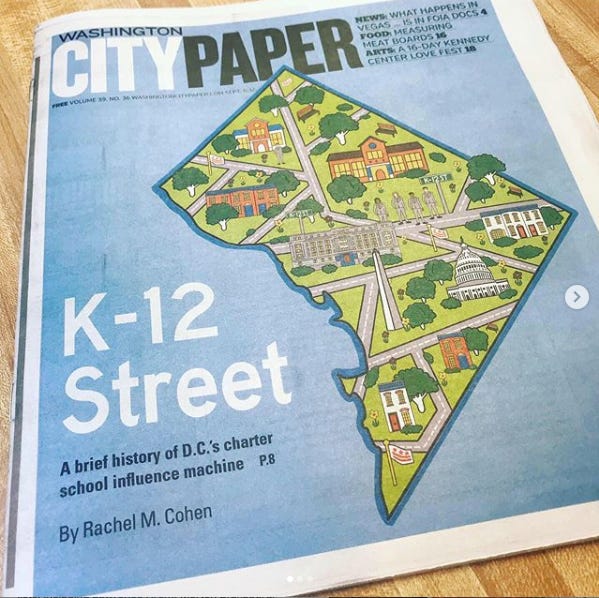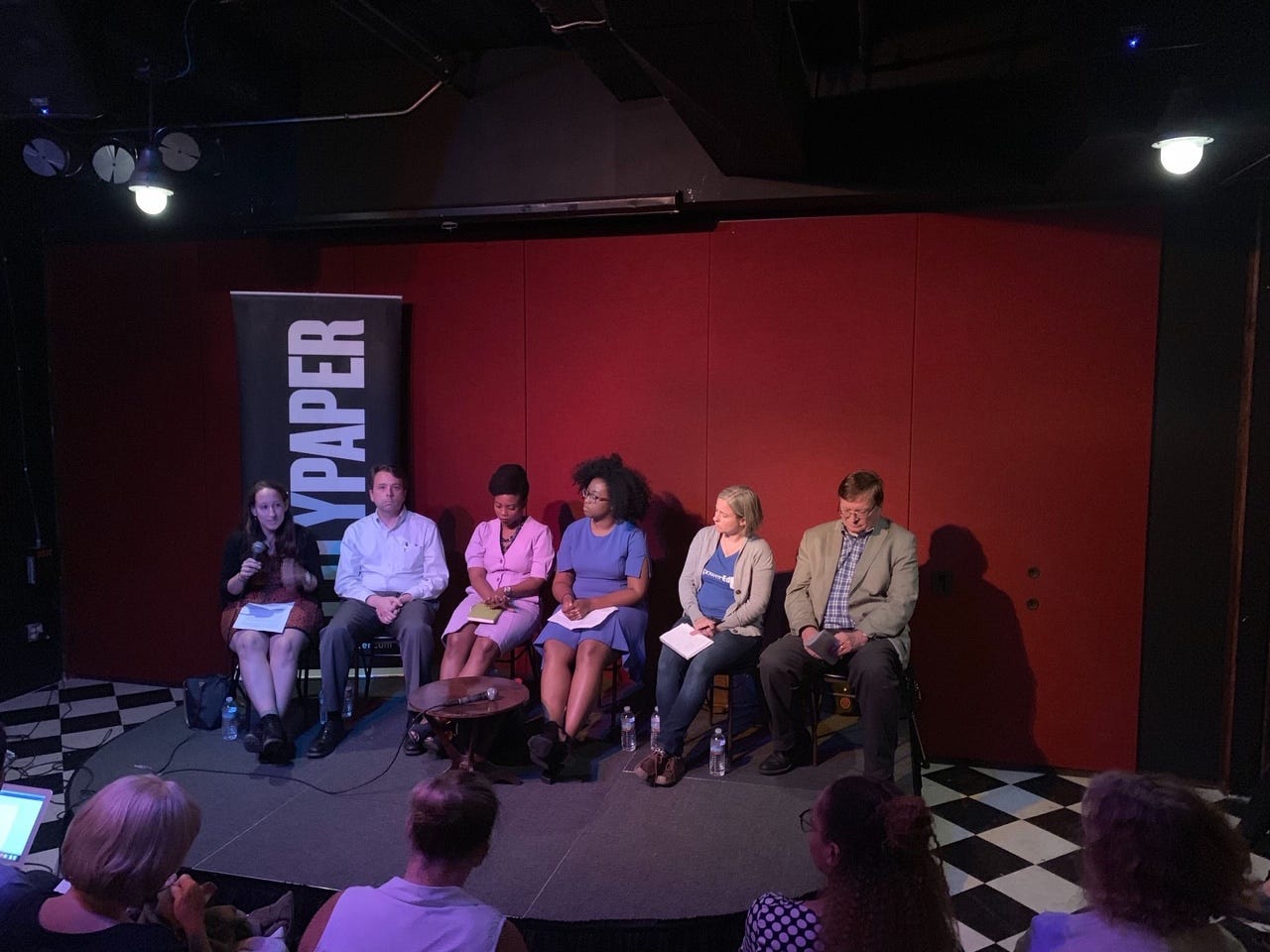I hope everyone is having a really nice holiday break.
I’ve been able to take some real time off for the first time in long time, which has been quite good. Especially since I imagine 2020 will be an extremely intense year for the news.
It’s a bit hard to believe I’ve made it another year as a freelancer but I’m glad to say I did. During 2019 I published 79 stories—across fifteen different outlets. I won two awards from the Society of Professional Journalists, and I reported a 7,000-word cover story with a grant from the Fund for Investigative Journalism. I started reporting a lot more on the politics of climate change, zeroing in on labor unions and how they can both help and stall political action. I also joined a new union, the Freelance Solidarity Project, which is affiliated with the National Writers Union. We’re working collectively to raise standards for freelance media workers across the board.
It’s been a gutting year for the news industry, with more than 3,000 journalists losing their jobs across the country, and some really amazing outlets like Pacific Standard shuttered altogether. I really, really appreciate and value your readership and financial support to help make this challenging line of work possible.
In keeping with roundups I did in 2018, 2017, 2016, and 2015, I’m going to lift up some of the work I’m most proud of from this year.
———
1.Washingtonian: “I Fully Intend to Outlast These People”: 18 Federal Workers on What It’s Really Like to Work for the Trump Administration
This magazine story featured vignettes from 18 civil servants who work in different agencies across the federal government. We don’t often hear about, or from, civil servants, since it’s political appointees who typically act as the government’s public face.
Everyone I interviewed for this story worked for the federal government since at least under Obama, and some since under Bush. They worked for agencies ranging from the State Department, Department of Justice and NASA, to the Department of Labor and the National Institute of Health. I wanted to learn what it’s like for them to go to work each day under the Trump administration, and learn what’s changed, what’s stayed the same, what’s hard, what’s surprising.
2. The American Prospect: As Consumer Protections Dwindle, Schools Push Financial Literacy
This feature looked at the powerful movement promoting “financial literacy” courses in public schools. I look at where this movement came from, why it’s spreading so fast, what research says about it, and who really benefits.
3. Washington City Paper: K-12 Street: How Charter Schools Won D.C. Politics
This one sought to understand how the local charter school movement in Washington D.C. has successfully beat back regulation over so many years.

City Paper organized a community event a few weeks after my story came out at a local music venue, where I moderated a panel with education stakeholders on school transparency.
4. The Hechinger Report: Can start-up companies profit off one of the lowest paid professions: home-based child care?
This piece looked at the rise of new tech startups which seek to make it easier for people to run childcare businesses in their homes. Think “airBnb for childcare business owners.” These companies have attracted millions of dollars in investment over the last few years, and have vast nationwide growth ambitions. The idea is to help providers with their bookkeeping, licensing, marketing and curriculum offerings, in exchange for a 10 percent cut of the revenue.
I traveled to San Francisco to report this out, and did my best to investigate some of the companies’ broad marketing claims. I spoke with people who feel the startups are bringing some much needed innovation, and others who see them as fairly predatory.
5. The Intercept: Conservatives Pushed A Strategy To Weaken Home Health Care Unions. The Trump Administration Bit.
I co-authored this piece with another reporter, Nick Surgey, and it featured an audio recording of an invite-only donor call from the right-wing State Policy Network two weeks before the Supreme Court’s Janus v. AFSCME decision. We reported on their unusually candid conversation about weakening unions and advancing a broad free-market agenda.
GOP activists also hired consultants to survey voters and "identify the best words and phrases" to shape their talking points around weakening unions. We published their 86-slide Powerpoint presentation in full.
6. The Intercept: Labor Unions Are Skeptical of the Green New Deal, And They Want Activists To Hear Them Out
Unions and environmentalists have not always seen eye-to-eye, and the building trades unions in particular tend to see progressive climate movements as very threatening to their interests. At the same time, the Green New Deal resolution includes a lot of explicit language in support of workers, collective bargaining, and strong labor protections. Its authors clearly hope to bring unions on board. Can they? I talked to a lot of unions for this story about that question.
Among others I interviewed Héctor Figueroa, the then-president of 32BJ SEIU, which represents door attendants, security officers, cleaners, and airport workers along the East Coast. In early February 32BJ became the first union in the country to endorse the Green New Deal, and Figueroa described to me his vision for even more union leadership on climate change. This past July, 57-year-old Figueroa unexpectedly died — a huge loss for progressives and the labor movement. But among other things, he did help get his parent union, SEIU, to endorse the Green New Deal in June.
7. In These Times: 8 Unions Have a Plan for Climate Action—But It Doesn’t Mention Fighting the Fossil Fuel Industry
One cool thing that happened after my Intercept story on labor and the Green New Deal came out was In These Times asked me if I’d like to start doing some more regular climate + labor reporting for them. So including this piece linked above, which I particularly liked, I was able to publish 7 ITT stories this year looking at intersections between labor and climate.
8. CityLab: New Jersey Is Getting Sued Over School Segregation
I reported on a rare statewide school desegregation lawsuit that’s currently ongoing in New Jersey. I also looked at why this lawsuit could impact not only school integration, but also longstanding debates around zoning and housing.
9. DCist: For Kids Experiencing Homelessness, Back-To-School Can Mark A Return To Stability
This year I participated in the fourth annual D.C. media blitz on homelessness, where local news organizations across the city dedicate a full day of coverage to the local homelessness crisis. For my part I covered what it’s like for homeless youth in D.C. during the back-to-school transition. Earlier this week it was recognized by DCist as one of their top 25 stories of the year.

10. Jewish Currents: Fear Is Not A Good Principle
It’s been great to watch the resurgence of Jewish Currents, a small and mighty magazine covering the Jewish left. This summer for them I had the honor of profiling 84-year old Barb Bearman, who has been fighting for school desegregation in Minnesota for the past five decades.

11. The Intercept: A Democratic Firm Is Shaking Up The World Of Political Fundraising
I reported on an obscure company, Grassroots Analytics, which wants to help people run for office who don’t have ready-made rolodexes of rich friends, family, and coworkers. Some say what they’re doing is illegal. Meanwhile, they’ve quietly raised millions of dollars for long-shot candidates. The story is about the opaque world of political fundraising, monopoly in the campaign industry, and data-sharing ethics in the 21st century.
12. Washington City Paper: D.C. Charter Administrators Have Some of the Highest School Salaries in Town; Their Teachers, Some of the Lowest
This was City Paper’s fifth most clicked on story for 2019, and it looks at salary disparities between DC charter teachers and traditional public school teachers. I also looked at some of the high salaries some D.C. charter school administrators make. One charter leader took home $541,000 in compensation in 2017.
13. The Intercept: A Small Chicago Firm Has Quietly Funded Nearly Two Dozen Anti-Union Lawsuits
I published this story on Monday, making it my last one of the year. It’s about a finance litigation firm in Chicago, that has been quietly bankrolling class action lawsuits in the wake of Janus v. AFSCME. Finance litigation firms work by funding lawsuits upfront, making bets that they will enjoy an ample cut of a plaintiff’s proceeds. The lead attorney on the lawsuits had previously denied his cases were part of any sort of coordinated effort.
Thanks so much for reading, and I’ll see you in 2020!



